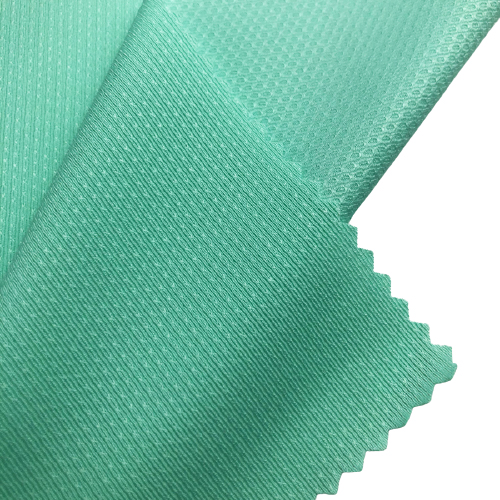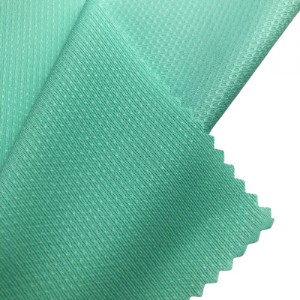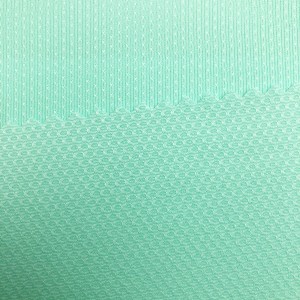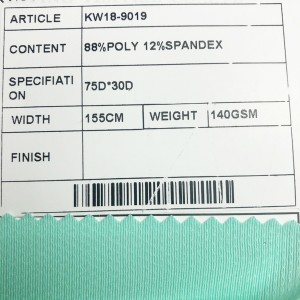|
PRODUCT CATEGORY |
Running Fabric |
|
ITEM NO |
KW18-9019-RCY |
|
Supply Type |
Make-to-Order |
|
Material |
88%Recycled Poly 12%Spandex |
|
Weight |
155GSM |
|
Width |
140CM |
|
Finish |
P/D+Wicking |
|
Sample time |
5-7 days |
|
Feature |
Breathable/High Elasticity/Quick-Dry/High Color Fastness |
|
Use |
Garment/Sportswear/Running wear |
|
Market |
USA/Canada/Australia/UK/Germany |
|
Certificate |
GRS/SGS/OEKO-TEX STANDARD 100 |
|
Place of Origin |
China (Mainland) |
|
Packaging Details |
packing in rolls with plastic bags or base on your requirement |
|
Payment |
L/C T/T |
|
Print Patter/ Custom design |
Sublimation print & Digital print as custom design |
|
MOQ |
1000M |
|
C0-Brand |
Adidas/ Nike/ H&M/ Vans/ Decathlon |
|
Sample Service |
Free |
|
Customized Pattern |
Support |
|
Our Service & Advantages |
Free sample available. Customized pattern, width, weight. Quick delivery. Competitive price. Good sample development service. Strong R&D and Quality Control team. |
|
Process Of Production |
1.Contact us 2.Developments 3.PO&PI 4.Bulk production 5.Payment 6.Inspection 7.Delivery 8.Long partner |
Running specific clothes are lightweight and designed to move with your body. Seams are placed in areas to enhance movement and where they are less likely to chafe. Also, many running-specific clothes are reflective so that you stay safe when running in the dark.
Running gear is usually made from fabrics including high-tech versions of nylon, wool, or polyester. During cold weather running, running in technical fabrics will help keep you dry and warm. On hot weather runs, they will wick the sweat away from your body and help prevent chafing.
rPET is just as good as virgin polyester, but takes fewer resources to make – Recycled polyester is almost the same as virgin polyester in terms of quality, but its production requires 59 percent less energy compared to virgin polyester, according to a 2017 study by the Swiss Federal Office for the Environment. WRAP estimates rPET’s production to reduce CO2 emissions by 32 percent in comparison to regular polyester.
In addition, recycled polyester can contribute to reducing the extraction of crude oil and natural gas from the Earth to make more plastic. “Using recycled polyester lessens our dependence on petroleum as a source of raw materials,” says the website of outdoor brand Patagonia, best known for making fleece from used soda bottles, unusable manufacturing waste, and worn-out garments. “It curbs discards, thereby prolonging landfill life and reducing toxic emissions from incinerators. It also helps to promote new recycling streams for polyester clothing that is no longer wearable,” adds the label.
“Because polyester accounts for approximately 60 percent of the world’s production of PET — about twice what’s used in plastic bottles — developing a non-virgin supply chain for polyester fiber has the potential to massively impact global energy and resource requirements,” argues American apparel brand Nau, also known for prioritizing sustainable fabric options.
Whether you contact local tailors or fashion companies to request their fabric scraps, or re-use your old clothing to create new pieces,
there’s always something that can be reused and recycled into something cool and new.
You’ll also find that fabrics made from recycled products are becoming more and more popular.
We’ve all seen the ‘I used to be a paper cup’ pens and journals, but now you can get fabrics made from leftover food scraps and plastics.
FAQ
Ordering Information
Payment: We usually accept T/T 30%
Packing: In roll packing with tubes inside and plastic bags outside or according to customers’ request.
Delivery Time:
LAB DIPS takes 2-4 days;
STRIKE OFF takes 5-7 days;
10-15days for sample development.
Plain dye color: 10-15 days.
Printing design: 5-10 days.
For an urgent order, could be faster, please send an email to negotiate.
Why choose us?
We buy yarn, produce greige fabric and dying or print by ourselves, that makes a more competitive price and faster delivery.
























